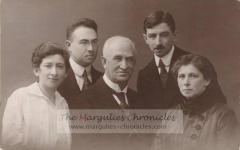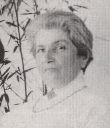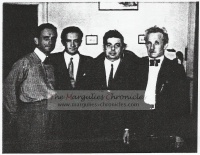« Prev. Page: The Margulies in Krakow
Next Page: The Remenyi Family »
Margulies Family History
Moritz Margulies and Clara Sussman
Unless otherwise noted, the following texts are my translations of excerpts from the chapter "Die Margulies Familie" in Meir Faerber's book, "Dr. Emil Margulies, A lifelong struggle for truth and justice."[1]The Margulies Family
The Margulies family belongs to the intellectual aristocracy of polish Jewry. The family history mentions their ancestors Jacob Margoles, a scholar from the Humanistic Period, who corresponded with Reuchlin [1455-1522]. Graez relates, how Reuchlin begged the Scholar to teach him the Kaballa. The careful Scholar politely delined this request.
Jacob Margoles was the direct ancestor of the great Talmud Scholar Salman Margulies*, a historical adornment of Brody
His grandson**, Moritz Margulies a profound Talmud adept, was one of the early "Maskilim", i.e. someone who managed to introduce wordly knowledge, and non-jewish literature into jewish scholarly circles. He has published a volume of hebrew poetry, and also hebrew translations of Schiller. He could speak several languages; studied literature as a hobby; used his business trips (he was a well-to-do businessman), for historical studies; after a thorough analysis of the material, he was the first to write a modern description of the life of Jud Süss [Joseph Süß Oppenheimer] and also wrote an interesting essay on the false Messias David Alroy. He was especially interested in family research.
* Ephraim Zalman Margulies 1762-1828 was an important Talmudist in Brody, as well as being a banker and the head of a Yishuva. He was recognised as an authority on questions of ritual.[2]
Brody was then in Eastern Galicia, and is now in the Ukraine].
** Not true, unfortunately. I suspect that Meir Faerber got his information from the same source as the person who created our hand-drawn family tree. New data shows that the Elyakim Getzel Margulies (b.1827) from whom we descend is not the son of Ephraim Zalman M. (b.1760), but the grandson of another Elyakim Getzel M. (b.1765) who was Ephraim Salman's brother.
More about his descendents here : No, we are not descended from Ephraim Zalman Margulies
Although we see signs that some of his children inherited his great passion and original intellect, their characters were formed and influenced much more by their mother.* But…
Both Moritz Margulies and his wife Clara - born Syszman - later turned totally towards western european intellectual thinking and acquired an astonishing autodidactic education. She was born in Galicia but brought up in the western intellectual tradition. Although without regular schooling, she was able to acquire a diverse education through reading and conversation, especially as the children were growing up.
Upon marrying she immediately distanced herself from from the religious and other jewish traditions, even more radically than her husband, although they kept up affection links to the more religious relatives. The children therefore saw nothing at home of jewish customs, prayers and festivals, and heard no word of hebrew, or jiddish, which was downright frowned upon*.
In 1895 Moritz and his family moved from Krakau (Krakow) to Kattowitz (Kattowice). He received a residence permit for this move on condition that only german would be spoken at home[3].
But as her sons one by one heard the blood of their ancestors speaking and they rediscovered their jewish feelings, their mother acted from the heart, immediately supporting her children, and became an upstanding jewess and warm zionist.
They had eight children: Anna, Isidor, Julius, Siegmund, Bella, Emil, Hans und Heinrich. Three died in adolescence [Julius, Siegemund & Bella ?]. Despite mothering eight children, the intellectually interested woman did not neglect Literature, Art and Society. She was especially interested in the italian Renaissance and travelled often to Italy. She was much more of an intellectual mentor for the children than their father. Her children where glad to ask her for advice and help, and their problems and worries found an understanding listener in her.
Both parents were long-lived and retained genuine friendships with their grown-up children, providing a stable foundation in their childrens' varied fortunes in life. The father was over seventy, the mother was over 80 when she died in 1932.
It is characteristic for the intellectual struggles of the jews of this period, how all the sons from such a pure east-jewish, but fully assimilated household, after a short or longer taste of the fruits of the german cultural environment, then turned to thoughts of the jewish nation.
Emil was in close contact with two of his brothers: the oldest, Isidor and the youngest, Heinrich. The parents sent both of them, as well as Emil, to larger cities, when they were still young, where they could visit better schools than were available in the small town of Sosnowitz [PL: Sosnowiec]. After completing german Highschool, Isidor came to Austria, where he studied law. While he was working as Law-Praktikant in Salzburg he came across a recently published brochure "The Jewish State" from Theodor Herzl. This slim book caused such a change in him, that he cut short his stay in Salzburg and moved to Vienna, in order to become a student of Herzl's. He became a champion of this new ideal.
This is but one of the countless examples for the power of Herzl's thoughts, that Isidor Margulies was brought to such an abrupt change in his life, - a man who seemed destined to be a quiet, genuine Humanist and Scholar, but was drawn into the political party fighting. He was a leader in the zionistic dealings of pre-war Vienna, was Head of the Jewish Minority League in Austria after the First World War, and during those years, became totally fluent in Hebrew. After the German Annexation of Austria he emmigrated to Palestine, where he still lives now [1949].
Under [Isidor's] influence, Emil Margulies, who had gone a similar route in his studies and choice of profession, also jettisoned his leaning towards German-ness and german culture, and took up the zionistic cause.
From the two younger brothers, Hans became an author and journalist, highly respected in the Viennese Press; He was Court-Reporter for all major jewish trials, amongst others, the Schwarzbart trial, in Paris. Nowadays he is living as emigrant in England.
A sister, Anna, was killed by the Nazis during the war.
This short account of the Margulies Family History shows clearly the intellectual factors of this nation and their repurcussions auf the destinies of a line of succession, which stands in full development. The highly bred intellectualism, the force of wills, the drive to achieve something for a regenerating nation, found their strongest expression in Emil Margulies.
See also: Moritz Margulies und Clara Sussman
Sources:
- Dr. Emil Margulies, Ein Lebenskampf für Wahrheit und Recht, Faerber, 1949, Tel Aviv
- Jüdisches Lexikon, 1927
- Vera Regine Röhl: "Es gibt kein Himmelreich auf Erden" - Heinrich Margulies - ein säkularer Zionist. Königshausen und Neumann, Würzburg 2014
« Prev. Page: The Margulies in Krakow
Next Page: The Remenyi Family »




